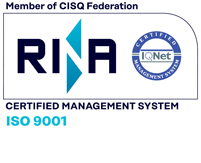
Discover the italian tax system on our guide “Doing business in Italy”
The Italian tax system is mainly based on the following taxes:
Corporate Income Tax (IRES)
All income produced by companies and institutions is subject to a corporate income tax known as IRES. IRES is due on all income produced within the scope of the company. The tax rate has been reduced from 27.5% to 24% starting from 2017 and it is applied on the taxable income (tax assessment basis).
The relevant payments are made up of two initial payments, one on accounts and one balance payment. There is a 3.5% surtax for bank and financial entities.
The tax period is generally 12 months and corresponds to the calendar year.
Withholding taxes are normally fully deductible from IRES. If the sum of the payments on account and withholding taxes exceed the tax payable, such excess may be carried forward and deducted from the tax payable relating the following tax period, reimbursed or used to offset any other tax and social security debts.
The following entities are liable to pay IRES:
-
limited liability companies, joint stock companies, cooperatives and mutual insurance companies, as well as European companies referred to in Regulation (EC) no. 2157/2001 and the European cooperatives referred to in Regulation (EC) no. 1435/2003 resident in the territory of the State;
-
public and private entities other than companies, as well as trusts, resident in the territory of the State, which have as their sole or main object the conduct of commercial activities;
-
public and private entities other than companies, trusts that do not have as their sole or main object the conduct of commercial activity as well as collective investment bodies, resident in the territory of the State;
-
companies and entities of all types, including trusts, with or without legal personality, not resident in the territory of the State.
Companies and institutions are considered to be resident when one of the following conditions is met for most of the tax period:
-
the registered office is located in Italy;
-
the administrative office is located in Italy;
-
the main object of the activities is located in Italy.
Regional Tax on Productive Activities (IRAP);
The regional tax on production activities (IRAP) is a local tax collected by the Region where the production activities liable for tax are carried out. If taxpayers perform their activities in establishments and offices situated on the territory of several regions, the distribution of the taxable income, and, therefore, of IRAP, is made in proportion to the cost of the employees working in the various regional establishments and offices.
IRAP is due by those subjects regularly engaged in an independently run activity in the production of goods or services in the Region. In particular, the following entities are subject to IRAP:
-
entities subject to IRES: resident commercial companies and institutions, and non-resident companies (at least 3 months permanent established) and institutions of any type with or without legal status;
-
joint-name partnerships, limited partnerships and those equivalent to simple partnerships practicing arts and professions and professional associations;
-
public and private non-commercial institutions (non-resident with at least 3 months permanent establishment) and public administrations;
-
individuals receiving company income; and individuals receiving income from self-employed work.
IRAP does not apply to mutual investment funds, pension funds, European economic interest groups (EEIG – “Gruppi economici di interesse europeo”) and door-to-door salesmen and persons engaged in agricultural activities according to Article 32 of ITC. For subjects not resident in Italy, IRAP only applies when the activities are conducted over a period of at least three months through a permanent establishment (for USA companies a partial “foreign tax credit” on IRAP is applied)
Value Added Tax (IVA);
VAT is a general tax on consumption applied on the “value added” on goods and services, in particular tax is due on the increase in value of goods or services in the different phases of production and trade, until it reaches the final consumer who incurs the full cost of the tax.
The transactions are subject to VAT if the following requirements are met:
-
objective requirement: there must be a transfer of goods or provision of services;
-
subjective requirement: the operations must be carried out within the running of business or the practicing of arts and professions;
-
territorial requirement: the operations must be carried out within the Italian territory
VAT substantially applies to the following operations:
-
transfer of goods made in Italy while running business or practicing arts and professions;
-
provision of services in Italy while running business or practicing arts and professions;
-
intra-EU purchases of goods from another EU member state while running businesses or practicing arts and professions;
-
purchases made by foreign countries of some services carried out in Italy while running businesses or practicing arts and professions;
-
imports of goods from non-EU countries, made by anyone.
However, VAT does not apply to all the aforesaid operations carried out in the Italian territory. Some operations are, in fact, tax exempt, while others fall outside the scope of VAT. The transactions “VAT exempt” are operations in compliance with the three above requirements, but they are excluded from VAT application by express provision of law, such as financial expenses, medical services, insurance premiums, etc. While the operations out of VAT scope are not compliant at least with one of the requirements.
Excise duty (Accisa);
The excise duty is a single-phase tax, harmonized within the EU, which is levied on certain specific products, at the time of their production or importation:
-
Energy products (fuels)
-
Electricity
-
Alcohol and alcoholic beverages
-
Tobacco products (cigarettes and similar products)
The tax is due by the producer or importer of the products concerned at the time they are released for consumption, and it is shifted, included in the sale price, to the final consumer who actually bears the whole tax burden.
The tax base on which the excise duty is applied is the amount of goods produced, imported or consumed.
Personal Income Tax (IRPEF);
This tax is personal and progressive.
The requirement for this tax is the possession of income, in cash or in kind, falling into one of the categories provided by law. The tax period corresponds to the calendar year.
Persons liable for tax
The following subjects are liable for tax:
-
natural persons resident in the Italian territory with reference to the entire income owned;
-
natural persons not resident within the Italian territory only with reference to the income produced in Italy.
According to the Italian Law, Italian residents are natural persons who, for most of the tax period, meet at least one of the following conditions:
-
they are registered in the registers of the population resident in the national territory;
-
they are domiciled in Italy (domicile to be understood as the center of interests, including moral and company interests);
-
They are resident in Italy (habitual abode).
Tax assessment basis
Tax is applied to the overall income, i.e. the sum of the items of income for each category that contributes to form it, minus any losses deriving from the practice of arts or professions and/or commercial businesses.
The relevant categories include:
-
land income, relating to land and buildings located in the Italian territory;
-
capital gain;
-
income from employment;
-
income from self-employed;
-
company income;
-
sundry income, included income earned from not usual activity of business, arts or professions.
Once the gross income has been determined, any deduction provided by law is applied in order to reduce the tax base.
Deductions (allowances/exemptions) which are equal to 19% of the charges incurred by the taxpayer, as listed in
Article 15 of the Italian Tax Code, are applied to reduce the gross tax.
The gross tax is computed by applying increasing rates on the taxable income, according to progressive income brackets.
Municipal tax on property (“IMU”, “Imposta Municipale Unica”) and other local taxes
IMU is the municipal tax charged on the ownership of buildings, buildable areas and agricultural lands situated within the Italian territory, intended for any use, including property used to performing business activities.
The holder of the property rights, or beneficial right such as usufruct, use, residence, emphyteusis, or surface right, or the concessionaire in the case of concession of state-owned areas, is required to pay the municipal tax.
In case of a financial lease, the lessee of a real estate is subject to pay this tax.
The tax basis is computed as follow:
-
for buildings, it is equal to the value obtained multiplying the cadastral rent increase of 5% for a different multiplier (from 55 up to 160), based on the cadastral class;
-
for building land, it is equal to the commercial value of the land as at January 1st in the FY;
-
for agricultural land, it is equal to the cadastral rent, increased by 25%, and multiplied by 135.
Exemptions for IMU purposes:
-
the buildings used as first home by the Taxpayer;
-
according to the Law 208/2015, starting from FY 2016 the agricultural land, cultivated, owned and run by farmers and professional agricultural entrepreneurs;
-
immovable property owned and used by public and private entities other than companies, by trusts which do not have as their sole or main object the exercise of commercial activity as well as by collective investment undertakings, resident in the territory of the State, intended exclusively for the non-commercial conduct of welfare, social security, health, scientific research, educational, hospitality, cultural, recreational and sports activities; z according to Budget Law 2021 (178/2020), from the year 2021, the IMU due on the only property unit, not leased, owned in Italy by non-resident persons, who receive a pension accrued under an international convention with Italy, is reduced to 50%.
Please note that, under certain conditions, verified by the municipality, or certified by the owner, 50% of the tax base of buildings unusable and uninhabitable is considered as IMU exempt until the buildings are reusable.
Following the amendments introduced by Law 160/2019, the tax is generally calculated by applying the basic rate of 0.8% to the tax basis
However, the municipality in which the real estate asset is located, as part of its own statutory authority, may increase such a rate up to 1.14% or decrease it even to 0%.
The tax amount due is paid in two installments within June 16th and December 16th of each Fiscal Year.



